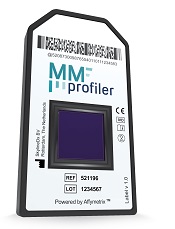
Photo courtesy of SkylineDx
The MMprofiler™, a test used to risk-stratify patients with multiple myeloma (MM), has received the CE-IVD mark.
The CE-IVD mark indicates that an in vitro device complies with the European In Vitro Diagnostics Directive and may be legally commercialized and distributed in the European Union.
The MMprofiler classifies patients into high- or standard-risk groups based on the activity of 92 genes considered to be related to MM.
In a 2012 Leukemia paper, researchers described a gene-expression signature, now known as SKY92, that maps the activity of the 92 genes. MM patients who were defined as high-risk by the SKY92 gene signature (called “the EMC92 gene signature” in the paper) had inferior overall survival.
Subsequent studies, including one recently published in Blood, have shown that patients whose plasma cells are SKY92-positive have, on average, 4-times shorter survival and relapse more quickly after treatment than patients whose cells are SKY92-negative.
The intention of the MMprofiler is to classify MM patients according to the SKY92 gene signature and help healthcare professionals select appropriate treatment on the basis of existing guidelines. Healthcare professionals may also decide to monitor patients differently according to their risk group.
The MMprofiler is a product of SkylineDx. The test is run on the company’s proprietary Profiler™ platform, which makes centralized data analysis possible for labs that have the necessary equipment.
To run the MMprofiler test, labs must install a software module on their Affymetrix DX2 Gene scanning equipment and establish a secured gateway connection with the Profiler platform. Then, the lab can process a patient sample and generate the raw genetic data.
The patient’s bone marrow sample is purified, processed, applied to a biochip, and analyzed in the scanner. This is how the MMprofiler determines the active properties of the various genes in the plasma cells of each patient.
The data is then processed via the software system, which reveals the genetic subtype of the plasma cells. Knowing the SKY92 genetic subtype can help healthcare professionals distinguish between high-risk and standard-risk patients.
For more information on the test, visit www.mmprofiler.com.


